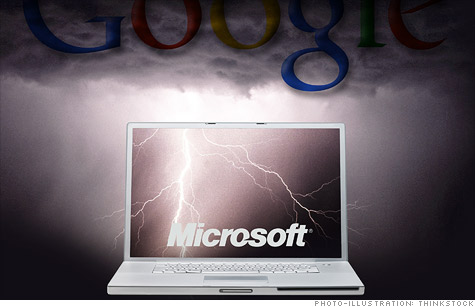
SAN FRANCISCO (CNNMoney) -- Google does battle with Microsoft in most of its business areas, but it's gearing up to tackle the big daddy of them all: Windows.
With Windows -- and Macs and other PC operating systems -- Google sees an inefficient, costly, and decidedly 20th century mode of computing. Data is stored on each PC's hard drive, so if a laptop is lost or damaged, all the data stored on it could be gone forever too. And when PCs break, they're expensive and time-consuming to fix.
That's especially true in the corporate world. Gartner estimates that each desktop in a corporation costs between $3,000 and $5,000 per year to manage. Laptops can cost even more.
Ironically, all that spending means offices end up with old, rickety computers that the users would never buy for themselves. The high cost of tech support makes it prohibitively expensive for many companies to keep their hardware and software up to date. Services firm NetApplications says that more than 50% of computers are still using Windows XP -- a 10-year-old operating system.
Google's (GOOG, Fortune 500) solution: Chrome OS, a Web-based operating system that is set for release on June 15.
On computers running Chrome OS, all of a user's information is stored in the cloud, in remote servers controlled by Google or other companies. Instead of a desktop software model, which relies on installed apps like Microsoft (MSFT, Fortune 500) Outlook and Word, customers will use on Gmail or another Web mail program, and Google Docs or Office 365, which exist online only. (Yes, you can run Microsoft's cloud Office software on a Google Chrome device.)
That goes for IT departments too. Intricate administrative software is replaced by a Web page that allows tech staff to manage all Chrome OS PCs. And Chrome OS automatically updates with the newest version, saving businesses from spending a fortune deploying new software versions.
"We're venturing into a really new model of computing," Sergey Brin, Google's co-founder, said at a press conference this week. "This head-to-toe software model eliminates a lot of complexity. Complexity is torturing everyone, and that's a flawed model."
Google believes it can save businesses at least 50% on their desktop support expenses if they switch to Chrome OS.
But Google has a long, long uphill battle to fight against the entrenched corporate behemoth that is Microsoft Windows. More than 90% of the world's computers run Windows.
Not every business is ready to simplify its hardware, since many rely on high-end software that does not yet exist as a Web application. And Google has had a shaky relationship with the enterprise in the past, gaining only tepid support for its cloud-based business applications suite.
Also, this has been tried before with practically zero success.
Nearly 20 years ago, Oracle CEO Larry Ellison predicted that "thin client," hard-drive-less desktops connected to and managed by a server would be the future of business computing. Sun Microsystems -- now owned by Oracle (ORCL, Fortune 500) -- also tried and failed to get businesses to adopt thin clients.
Google acknowledged past failures but says that this time, it's different. The company surveyed 400 businesses of all sizes and found that 75% said they could migrate to Chrome OS.
People are now more accustomed to running applications out of a browser, Google executives say. The company partnered with virtualization giant Citrix to allow Chrome OS computers to run Windows applications hosted in the cloud, letting businesses run Adobe (ADBE) Photoshop, for instance, on Chrome OS.
Also, unlike pervious attempts, Google is providing both the operating system and the computer as one package: For $28 per user per month ($20 for government offices and schools), companies can rent "Chromebook" netbooks from Google and get support included.
"For the first time, hardware and software are being packaged together as a service," said Sundar Pichai, Google's senior vice president of Chrome. "We think this can fundamentally change the way people use computing in companies."
As evidence that companies of any size can deploy Chrome OS, Google itself is in the process of switching over to the new operating system.
"We will be deploying them increasingly internally," Brin said. "I hope to report next year that we have a very small percentage of anything other than Chromebooks at Google."
Google thinks it can change the face of computing. The only obstacles: The world's largest software maker, notoriously stubborn IT departments and decades of history going against it.